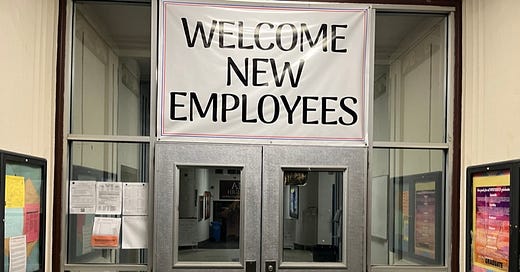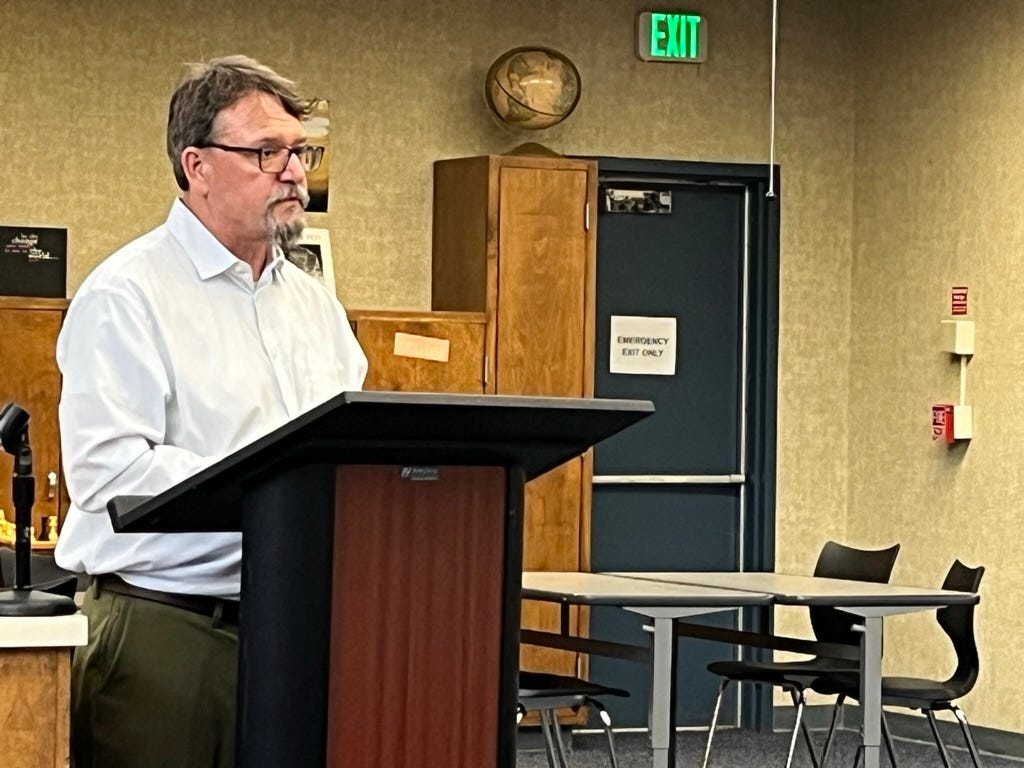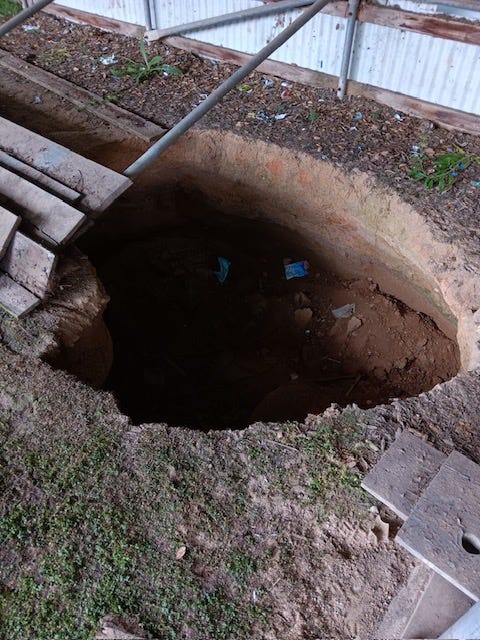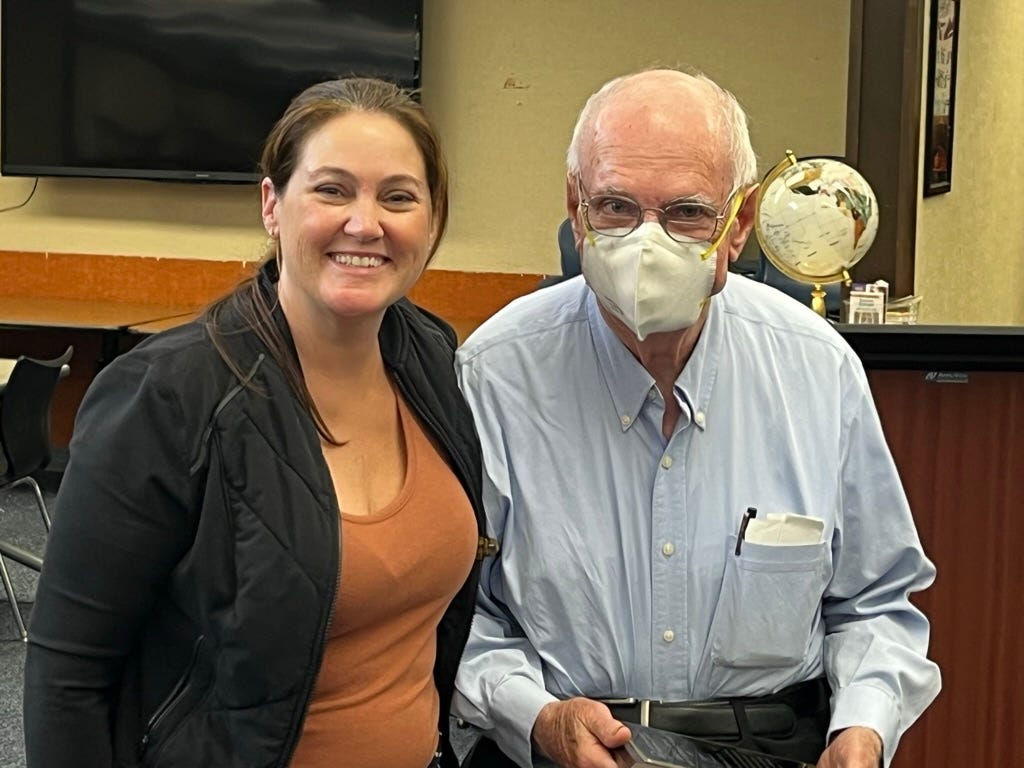New faces and fresh paint for Analy
There was still some sparring and a sinkhole to watch out for
The first school board meeting of the new school year reflected the optimism of starting a new school year. (It was a hybrid meeting with Board President Julie Aiello attending via Zoom due to health reasons.) New principal Chuck Wade is the most notable of the new hires, but 27 new employees were hired by the District over the summer, according to HR director, Mia Del Prete.
Twenty of the new hires are new teachers. Wade remarked that he felt the school was lucky to be able to attract and hire new teachers. Many of his colleagues in other districts were having trouble hiring new teachers by the time school opened. He “was super impressed by the high quality of new staff.” President of the Teachers’ Association,Lily Smedshammer, said that the new hires were “incredible” and congratulated Del Prete on her hard work over the summer.
The Alumni Association paid for signs that welcomed the new employees at the main entrance for Analy and Laguna High Schools.
Each new teacher has been assigned a peer coach; Wade expressed how important it was to provide support for new teachers.
In what was the final item on the agenda of the three-hour meeting, Facilities Director Jennie Bruneman asked members of her team who were on site to come join the audience in the meeting. She called them “unsung heroes” and “the busy bees who work all summer” while teachers and students are away. Here are the members of the team:
Grounds: Logan Atwell, Marcos Guillen Rivas and Sam Avalos
Custodial: Francisco Soto, Paul Pomposo, Antonio Soto, Jose Hernandez Soto, Ismael Hernandez, and Joe Maciel Soto
Technology: Jay Fabian, Matt Yonkers and Brian Lee
Maintenance: Les Siedentopf
Supervisor of Maintenance: Denise Fisher
Supervisor of Technology: Jay Fabian
Bruneman described how the campus is thoroughly cleaned during the summer and countless maintenance tasks are performed. In the main building, new flooring was put in and the walls painted. Les, a member of her team, took the initiative to re-stripe the parking lot. “He’s such a perfectionist,” she said proudly. The long-running project to install skylights in the main building was completed while HVAC upgrades are still going through the permitting process.
A Sinkhole Near the Stadium
Bruneman described a sinkhole that was discovered under the visitor bleachers (alongside Eddy Lane). It was caused by a bad pipe. They are able to fix the problem temporarily, calling it “a successful patch on old pipe.”
In a followup email, Bruneman wrote:
The sinkhole was caused by a broken 10-inch storm drain pipe that we have since uncovered and made a repair to. While the hole was opened, we ran a camera through the rest of the stadium’s storm drains and that is when we found two large breaks upstream of the sinkhole that we are now working on fixing.
Hopper Awards
Superintendent Chris Meredith announced the Becky Hopper “Make A Difference” awards for the Student Activist Club and teacher Jerod Brown. The one winner present at the meeting was Steve Porter who ran the theater at Analy and El Molino. This is the second time that Porter received the Hopper award; one for his work in theater as a teacher and this one for his efforts as a volunteer in the theater after he retired. Bruneman who presented the award to Porter said she often called Porter to ask him a question about the theater building.
DEI plan seeks to create inclusive school culture
A Diversity, Equity and Inclusion (DEI) Committee was formed last year by Superintendent Chris Meredith and enthusiastically supported by new board members, Lewis Buchner and Debbie Ramirez. The District has also hired Anita Sandwina as Diversity, Equity and Inclusion Teacher on Special Assignment.
The DEI Committee had some false starts last year, according to some participants, but they now have developed a strategic plan that Buchner said defines a 5-10 year project. “The plan is amazing,” he said. The committee hopes to begin sharing the plan with staff over the next four weeks. Buchner said “what inclusion means is broad, addressing not just race, gender and class but also geography, as well as ag and academic students. “The plan will change school culture for the better,” he insisted. Trustee Ramirez said that “it was going in a nice direction.” Superintendent Meredith said the goal was to “build a sustainable inclusive culture” at Analy, admitting that inclusivity been a problem for the school in recent years.
Enrollment up
Early signs are that enrollment at Analy is up at the start of the year, according to Meredith. 1572 students were currently enrolled which is higher than the 1534 students that were projected for the year. The daily attendance rate is 92% for Analy, which appears to be trending similar to last year. Laguna High School is seeing 99% attendance through the 5 days of school.
Spirit Week
A long list of rituals resume along with the school year. One such ritual is Spirit Week, leading up to the first football game of the year and the back-to-school dance. Tuesday was “whiteout” day with everyone encouraged to wear white. Wednesday was Wild West day, which Principal Wade said he was “not able to participate in due to a wardrobe malfunction.”
The Analy Tigers play Lincoln at 7pm on Friday at home. You should wear Blue AND Red, apparently.
Getting a Certified Athletic Trainer on Staff
Kai Hamblin, a football coach at Analy as well as a parent of two student athletes and the CTE teacher for the Sports Medicine Pathway, made a persuasive case that the school should have a certified athletic trainer on staff. He cited the need for a trainer to work with all athletes in the school’s programs, both boys and girls. Some public schools in the area that employ athletic trainers include all Santa Rosa City Schools, Rancho Cotate, and Windsor high school.
Hamblin pointed out the prevalence of injuries to students in sports, in particular, football and girls soccer. Having an athletic trainer on staff would help ensure better care for students following an injury, and also respond quickly when an injury occurs during a practice or game. Having a trainer would also offer other benefits such as reducing the number of days missed by student in class
Hamblin also pointed out that a Certified Athletic Trainer could play an important role in the Sports Medicine CTE Pathway, helping to train students in the program. Principal Wade and Superintendent Meredith have been supportive and he intends to work with them to pursue possible funding sources, including Career and Technical Incentive Grant funds.
While he performs some of the duties of an athletic trainer on campus, Hamblin said that he is primarily a teacher focused on preparing for his class instead of keeping up with the latest advances in sports medicine and athletic training. Loretta Castleberry spoke up to say that with her fifty years on campus and as the wife of a coach and mother and grandmother of athletes, the need was clear to have an athletic trainer on campus.
Here is a link to Hamlin’s slide presentation on Analy Athletic Trainer .
Sparring Partners
While everyone present — staff, admin, trustees — seemed positive going into the new year with new leadership, there were signs of a carryover from last year’s bitter ending — three top administrators resigned and the teacher’s union presented the trustees with a resolution that lay the blame on the first-year superintendent, accusing him of discrimination; Trustee Lewis Buchner responded in the Sebastopol Times, rising to the defense of Meredith. The response seemed necessary if the District was to retain any stability in its top leadership. At this Board meeting, there were plenty of opportunities for sparring among those who otherwise might be close partners.
Start-of-Year Teacher Survey Results
Lily Smedshammer, President of WSCTA, shared the results of a survey of teachers at the start of the school year. There was an edge to her remarks, setting a tone for the WSCTA going into contract negotiations with the District. It’s hard to know how much of this sparring is softening up an opponent or just practice for a later match. It does reflects a certain reality of the nature of the game they are playing — leadership changes every few years but the teachers remain unchanged in their positions and in the desire to have more of a voice in critical decision-making.
No surprise, then, that Smedshammer opened with: “Every single respondent listed wages as their first concern out of a list of 6 negotiation options.” One teacher commented: “Speaking from experience, as a new teacher, if you do not have roommates you can live with or parental/familial support, you cannot afford to live anywhere near school, let alone in the county.”
Many members objected to the superintendent receiving a 6% raise during the summer, the same percentage that teachers received. “A 6% raise, on top of the contractual 1.5% increase, amounts to nearly $15,000. Meanwhile, that 6% increase for teachers averaged around $3,700. Percentages as me-too raises just don’t work and are not equitable.”
Smedshammer presented a list of what teachers wanted from the administration and Board:
Maintain vigilance of the Superintendent's performance as a leader of our district
Advocate and communicate consistently with our site administrators
Engage with selecting professional development topics and presenters
Develop a positive, transparent relationship with our Superintendent
Improve communication with the Tech, Maintenance, and Facilities Departments
Ensure that our members are involved in future facility construction plans
A constant complaint from teachers is the HVAC, plus the state of the bathrooms. Smedshammer concluded: “We’re looking forward to teaching our new crop of students, and to a strong negotiation year.”
A skirmish over hiring a consultant
The tension between the Trustees and the WSCTA with the Superintendent in the middle was evident in the discussion to approve a consulting contract to develop a new 3-year Local Control Accountability Plan (LCAP). The District is required to develop a plan for 2024-2027 and document its funding priorities, and, in particular, say how it is prepared to serve all of its students.
The proposal was for a $20,000 contract to bring in a consultant who would help structure a process and work closely with Superintendent Meredith to develop the plan, as well as coordinate with the administration and staff as well as the community to gather feedback.
Three members of WSCTA stated their objection to using money to hiring a consultant. Lily Smedshammer said that the plan should be generated internally. She challenged the superintendent to develop this plan without help from outside. She said that the money used for the consultant could be used to fund a new section (course) for students. Meredith needs to be “more hands-on”, she said, and he needs “to learn to do this vital part of his job.” Teacher and lead negotiator for WSCTA Brian Miller called the consulting contract “a wholly unnecessary expense.” Violet Trindell, treasurer of WSCTA and a special education teacher, said that “the process should be kept in-house.”
Debbie Ramirez responded, saying that “it didn’t look to me like we are outsourcing the LCAP.” As she saw it, “we were hiring someone to hold process.” She expected that the consultant would help address some technical issues while “there would be significant community input.”
Lewis Buchner pushed back against the critics of the superintendent. “In a perfect world, we’d have a perfect superintendent who can do everything well. Chris is a good guy and smart but he’s gotten a bad rap. Maybe he needs support on this and that’s okay.”
Board President Julie Aiello said that this LCAP wasn’t the first one that the District had developed and she had “not heard that anyone was happy with the plans developed in the past.” The LCAP was created and then set aside and never consulted. “Let’s not do it the way we’ve always done it,” said Aiello. Jeanne Fernandes agreed with Aiello, adding that the the previous LCAP "that Meredith inherited was useless.” She hoped that the process would “create a document that’s really used.” The board approved the consulting contract.
Look, no hands
Going into the board meeting held at the Library, I noticed that the hands were missing from the clock. By email, Jennie Bruneman explained: “The clock motor is broken and it's ancient, and not easily repaired. Believe me, we looked into it and it's a rabbit hole and likely a bit of a money pit. We took the hands off the clock because people were frustrated that the time was not right.” She added that there is a “campus modernization goal to redo the tower.”








